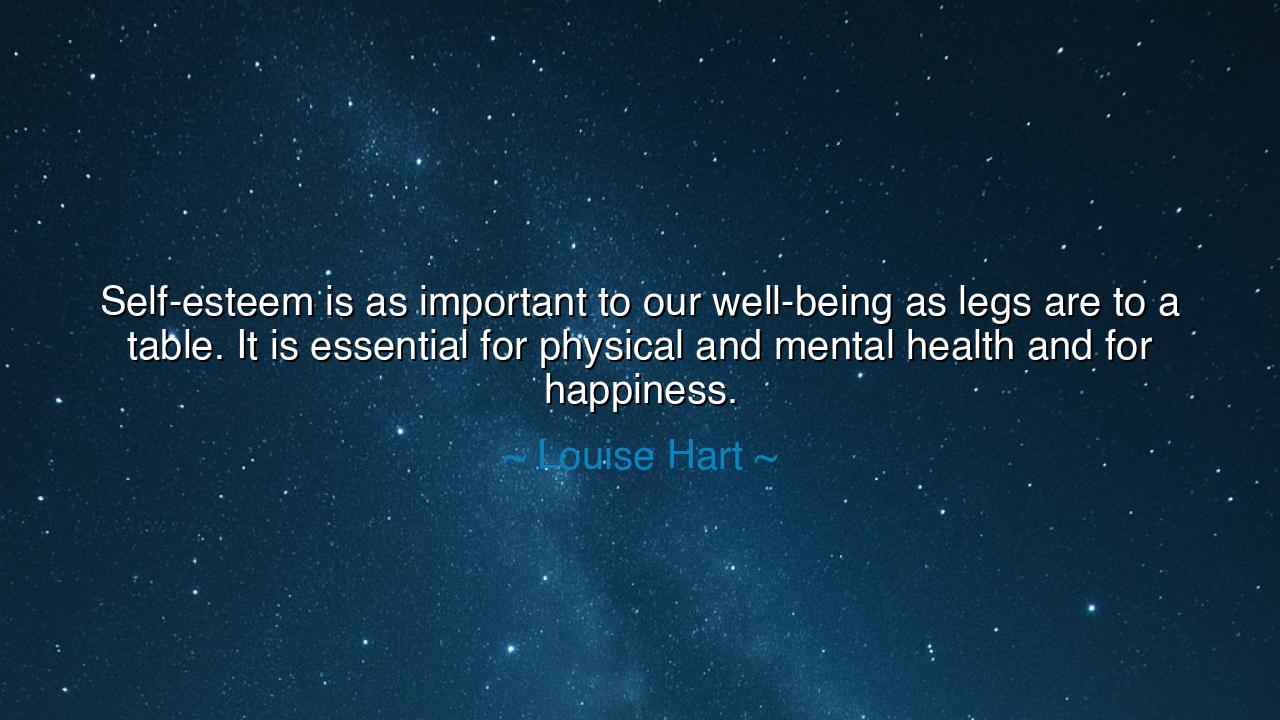
Self-esteem is as important to our well-being as legs are to a
Self-esteem is as important to our well-being as legs are to a table. It is essential for physical and mental health and for happiness.






In the luminous words of Louise Hart, author and teacher of emotional growth, we find a truth that touches the very foundation of the human spirit: “Self-esteem is as important to our well-being as legs are to a table. It is essential for physical and mental health and for happiness.” These words, simple yet profound, reveal that self-esteem is not a luxury, nor a decoration of the soul, but its very structure — the support upon which life itself must rest. Without it, the heart trembles like a table without legs: unstable, unsteady, unable to hold the weight of existence. Hart’s insight is not born of philosophy alone, but of observation — of the countless souls who stumble not for lack of ability, but for lack of belief in their own worth.
In the ancient world, the philosophers spoke much of balance and harmony. The Greeks called it eudaimonia — the flourishing life, where the inner spirit (daimon) was in alignment with virtue and self-respect. For to despise oneself was seen as a kind of illness, a wound that spread from the mind into the body and into the world. So too does Hart, in the modern age, echo this timeless truth: that self-esteem — the quiet assurance of one’s value — is the foundation of health, peace, and joy. Just as the body cannot stand upright without strength in its bones, so too can no person stand upright in life without faith in their own dignity.
The image she gives — the table and its legs — is one of profound clarity. The table is our life: its surface holding the weight of our dreams, our duties, our relationships. The legs — unseen beneath — are the invisible supports: confidence, self-respect, inner belief. When those supports are strong, the table stands steady, able to carry all that life places upon it. But when they are weak, even the lightest burden — a harsh word, a setback, a failure — can cause the whole structure to collapse. Thus, to neglect one’s self-esteem is to leave one’s very life vulnerable to the smallest tremors.
History offers many examples of those who have built their strength not upon external power, but upon inner worth. Consider Eleanor Roosevelt, who as a young woman was told she was plain, unremarkable, and unfit for greatness. Yet she cultivated within herself an unshakable belief in purpose, a quiet self-respect that neither insult nor doubt could destroy. In time, she became a voice for justice and compassion, guiding nations with her courage. She once said, “No one can make you feel inferior without your consent.” In this, she spoke the same truth as Louise Hart: that self-esteem is not given by others, but forged within — the root from which all strength and healing grow.
The wisdom of Hart’s words also reminds us that self-esteem is not vanity, nor pride. The ancients warned against arrogance, but they also condemned despair. True self-esteem is not the boastful cry of the ego, but the calm knowing of one’s worth — the recognition that one is a vessel of potential, worthy of care and capable of good. It is the sacred balance between humility and confidence. When we see ourselves rightly — neither exalting nor diminishing our value — we become whole. The mind grows peaceful, the body thrives, and happiness takes root, not as a fleeting pleasure, but as a steady flame.
In our age, many suffer from the sickness of self-neglect — seeking validation from the outside world, measuring their worth by comparison and approval. But Hart’s teaching calls us back to the inner temple, where true esteem is born. Just as a table must be repaired from its base, not its surface, so too must we rebuild our sense of self from within. No praise from others can substitute for inner belief; no wealth or beauty can replace the quiet strength of knowing, “I am enough.”
The lesson, then, is this: tend to your self-esteem as you would tend to your health, for the two are bound together. Speak to yourself not with cruelty, but with compassion. Honor your achievements, forgive your failings, and remember that your worth is not measured by perfection, but by persistence. Strengthen your inner legs — through gratitude, self-care, learning, and love — so that the table of your life may stand firm against every storm.
And so, my friends, carry with you the wisdom of Louise Hart: to love oneself rightly is not indulgence, but necessity. It is the cornerstone of happiness, the guardian of health, and the source of courage. Build your self-esteem as you would build a temple — patiently, reverently, upon the solid ground of truth. For when you do, you will stand unshaken, and your life will hold steady all that is placed upon it: your dreams, your struggles, and your joy.






AAdministratorAdministrator
Welcome, honored guests. Please leave a comment, we will respond soon